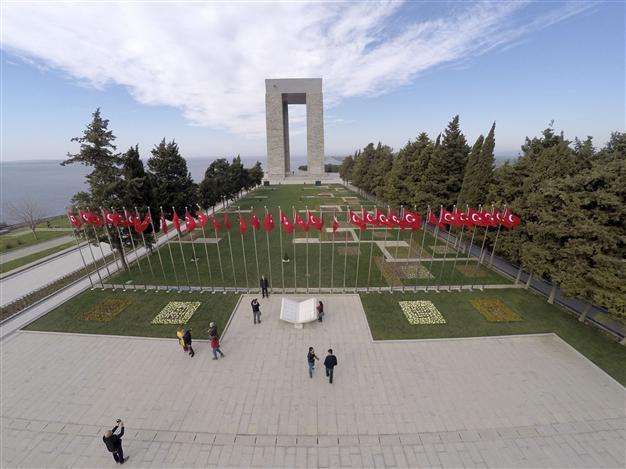Dignitaries to flock to Gallipoli anniversary
ANKARA

AA Photo
Turkey will host leaders from all corners of the world when it holds commemorations for the 100th anniversary of the Battle of Gallipoli April 24-25.The heads of state for 20 nations will be in attendance, while two parliament speakers, three vice presidents, five prime ministers and around 20 ministers will also attend the ceremonies.
Turkey has rescheduled the international commemoration of the Gallipoli campaign to coincide with the date when Armenia traditionally commemorates the 1915 massacres of Ottoman Armenians, which it refers to as the Armenian genocide.
Heads of state from Albania, Azerbaijan, Bosnia and Herzegovina, Chad, Djibouti, Iraq, Ireland, Kosovo, Macedonia, Mali, Montenegro, Niger, Pakistan, Qatar, Senegal, Slovenia, Somali, South Sudan, Turkish Cyprus and Turkmenistan will attend the events in Çanakkale on April 24-25. Hungary will meanwhile be represented by its former president.
The prime ministers of Australia, Moldova, New Zealand and Romania will be in Çanakkale. Neighboring Syria will be represented by the spokesperson of the Syrian National Coalition (SNC), Khaled Hodja, since Ankara doesn’t consider the current regime in Syria legitimate.
Bahrain, Canada, Croatia, France, Gabon, Georgia, Ghana, Guinea, India, Lebanon, Lithuania, Mongolia, Mauritania, Mozambique, Singapore, South Africa, South Korea, Tajikistan, Tunisia and Vietnam will be represented at the ministerial level.
The U.K.’s Prince Charles and Prince Harry have already confirmed that they will attend the events at Gallipoli.
Armenians are incensed that Turkey brought forward the anniversary date for the key World War I battle by a day to April 24 from April 25, which is when Allied forces began their doomed land offensive for the peninsula on the Dardanelles Straits.
For Turkey, the Battle of Gallipoli is said to have given birth to a national consciousness and marked a key step in the creation of modern Turkey as the Ottoman Empire crumbled.
Many of the commanders who fought in the grinding almost nine-month battle - considered one of the Allies’ most significant defeats - would play a key role in the founding of the Republic of Turkey, including Mustafa Kemal Atatürk.
But 1915 has a far darker resonance for Armenians, who say 1.5 million of their ancestors were killed in a campaign of genocide by Ottoman security forces aiming to eradicate them from Anatolia, in what is now eastern Turkey.
















